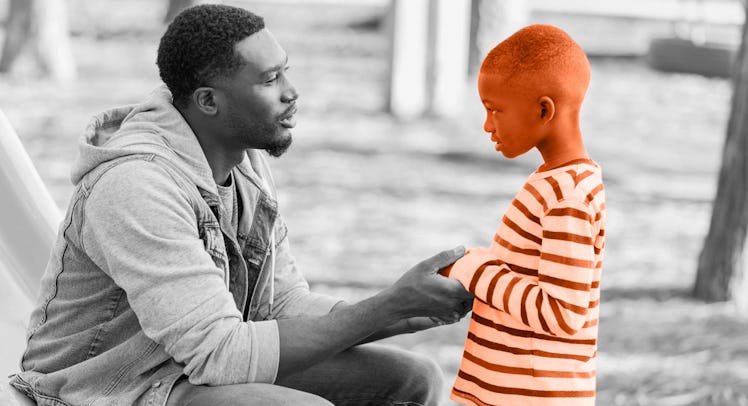How to Spot the Signs a Kid is Being Bullied or Becoming a Bully
Bullying thrives out of view. In order to learn what's happening in their children’s lives, parents need perception, patience, and presence.

Bullying isn’t merely being teased, getting into a fight, or drifting from friends. Those are normal aspects of growing up, as kids learn to navigate the feelings of themselves and others. Instead, bullying is profoundly opportunistic, targeted behavior that is often hidden and specifically designed to inflict cruelty. That sometimes makes it hard for parents to tell if a child is a bully or being bullied. And when parents can’t recognize bullying from either side, it becomes impossible for parents to help their children.
READ MORE: The Fatherly Guide to Bullying
“I don’t think parents are going to observe it very often,” says explains Dr. Roseanne Lesack, a licensed psychologist, board-certified analyst, and director of a child psychology unit at Nova Southeastern University. “How often are parents really seeing the social interactions that are going on with their children? Most of them are occurring at school, on the playground or in gym class..”
How to Spot Signs of Bullying
- Don’t Push a Child to Talk – kids won’t respond well to being pressured to talk. Instead, work on simply spending time with the child. It doesn’t matter what, as long as parent and child are together – and parents can refrain from asking too many prying questions
- Observe Them in Nature – when parents pick up or drop off kids at school or events, how do they treat the kids around them? How are they treated?
- Observe Them at Home – how do they treat their siblings? Statistically, siblings are more likely to be bullied.
- What are Their Friends Like? – bullies tend to be friends with other bullies. This complicates things because it makes bullying behavior seem more acceptable
Bullying thrives where adults can’t intervene – which is why cyberbullying can be relentless – or when the bully has a level of plausible deniability. It may require targets or other classmates to report it in order for it to be recognized. But bullied kids are often reluctant to admit it. They might be embarrassed, exhausted, or feel they deserve it. Parents aren’t going to be likely to coax info out of their children directly.
“I think for those middle school parents it’s hard, but it’s just being there and available for your children,” says Lesack. “It’s a very fine line between being helicopter parents and being available. You also don’t want to interview for pain. If it was hard and terrible they’ll tell you. Otherwise, if it wasn’t, you’re now bringing all those emotions back if you ask about them.”
RELATED: How to Safeguard Your Child Against Cyberbullying
The best way for a parent to learn what their middle school child is going through is simply to spend time with them. Not dominating the conversation. Not leading the conversation. Just being present. It might seem counterintuitive, but asking a question gives kids an easy out: answer the question and nothing more. Instead, Lesack says, just do things with them: Cook. Do the dishes. Draw pictures. Sit in the same room and read. It may take some time for a kid to organize his or her thoughts, and parents shouldn’t push them to answer.
“If you’re always asking questions, they’re always going to be answering. But that’s not what you want to know,” advises Lesack. “You want to know what they’re thinking. But if you always put static and noise out there, you’re never going to get there.”
It can be equally hard for parents to know if their child is a bully; the bullied child isn’t likely to come over to hang out. A kid might not even realize they are a bully. They may think it’s just the way their peers joke. Or they may think it is treatment their victims deserve. Kids pick up all sort of toxic ideas from their friends.
MORE: How to Fight the Bad Influence of Your Kid’s Bully Friend
“Most likely, the bullying children are probably going to be hanging out with other bullying children,” warns Lesack. “So I think it is important for parents to get a sense of what types of friends are their children hanging out with? Are they good influences? Are they polite in your home? Do they seem to be thoughtful individuals?”
Parents should also consider how their child treats siblings and cousins. It may take a little more mindfulness or subtle observation around the house, but how they interact with their younger family members can shed light on how they behave with other peers.
Whether recognizing a victim of bullying or a bully, both of these realizations can be hard for a parent to make. But that’s the burden of the job. Parents can enlist teachers, counselors, therapists and religious leaders to help bullied kids and bullying kids to be their best selves, but the ultimate responsibility falls upon parents themselves.
This article was originally published on